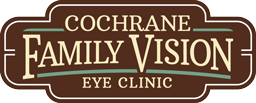Pediatric Eye Exams
At Cochrane Family Vision, our doctors and team of staff are very passionate about eyecare and eyewear for children. We want to make sure your child has a great experience at our clinic!
80% of learning is visual which makes comprehensive eye examinations an important part of your child’s development and learning. Children’s eyes also change rapidly as they grow. According to the Canadian Association of Optometrists (CAO):
- Infants and toddlers should have their first eye examination between the ages of 6 and 9 months
- Preschool children should have their eyes examined at least once between the ages of 2 and 5 years
- Children aged 6 to 19 should have annual eye examinations
More frequent eye exams are recommended if there are possible signs of a vision problem or if the child has certain risk factors (such as developmental delays, premature birth, crossed or lazy eyes, family history or previous injuries). A child that wears eyeglasses or contact lenses should have his or her eyes examined yearly.
Following the guidelines for children’s eye exams and staying alert to any signs of vision problems can help your child to reach his or her potential.

Infants: Birth – 24 Months
A baby’s visual system develops gradually over the first few months of life. They have to learn to focus and move their eyes, and use them together as a team. The brain also needs to learn how to process the visual information from the eyes to understand and interact with the world. With the development of eyesight comes also the foundation for motor development such as crawling, walking and hand-eye coordination.
You can ensure that your baby is reaching milestones by keeping an eye on what is happening with your infant’s development and by ensuring that you schedule a comprehensive infant eye exam at 6 months. At this exam, the eye doctor will check that the child is seeing properly and developing on track and look for conditions that could impair eye health or vision – such as strabismus (misalignment or crossing of the eyes), refractive error (farsightedness, nearsightedness, or astigmatism), or eye health conditions.
Because there is a higher risk of eye and vision problems if your infant was born premature or is showing signs of developmental delay, your eye doctor may require more frequent visits to keep watch on his or her progress.

Eye Exams in Preschool Children: 2-5
The toddler and preschool age is a period where children experience drastic growth in intellectual and motor skills. During this time they will develop the fine motor skills, hand-eye coordination and perceptual abilities that will prepare them to read and write, play sports and participate in creative activities such as drawing, sculpting or building. This is all dependent upon good vision and visual processing.
This is the age when parents should be on the lookout for signs of lazy eye (amblyopia) – when one eye doesn’t see clearly, or crossed eyes (strabismus) – when one or both eyes turns inward or outward. The earlier these conditions are treated, the higher the success rate.
Parents should also be aware of any developmental delays having to do with object, number or letter recognition, color recognition or coordination, as the root of such problems can often be visual. If you notice your child squinting, rubbing his eyes frequently, sitting very close to the tv or reading material, or generally avoiding activities such as puzzles or coloring, it is worth a trip to the eye doctor.

School-Aged Children: Ages 6-18
Undetected or uncorrected vision problems can cause children and teens to suffer academically, socially, athletically and personally. If your child is having trouble in school or afterschool activities there could be an underlying vision problem. Proper learning, motor development, reading, and many other skills are dependent upon not only good vision, but also the ability of your eyes to work together. Children that have problems with focusing, reading, teaming their eyes or hand-eye coordination will often experience frustration, and may exhibit behavioral problems as well. Often they don’t know that the vision they are experiencing is abnormal, so they aren’t able to express that they need help.
In addition to the symptoms written above, signs of vision problems in older children include:
- Short attention span
- Headaches
- Frequent blinking
- Avoiding reading
- Tilting the head to one side
- Losing their place often while reading
- Double vision
- Poor reading comprehension
Contact Us
#12, 80 Bow Street, Cochrane, Alberta
Located across from Save-On-Foods
Hours of Operation
- Monday9:00 AM - 5:30 PM
- Tuesday9:00 AM - 5:30 PM
- Wednesday8:00 AM - 8:00 PM
- Thursday8:00 AM - 8:00 PM
- Friday9:00 AM - 5:30 PM
- Saturday9:00 AM - 3:00 PM
- SundayClosed

We are proud members of the
Eye Recommend Network Of Optometrists.
